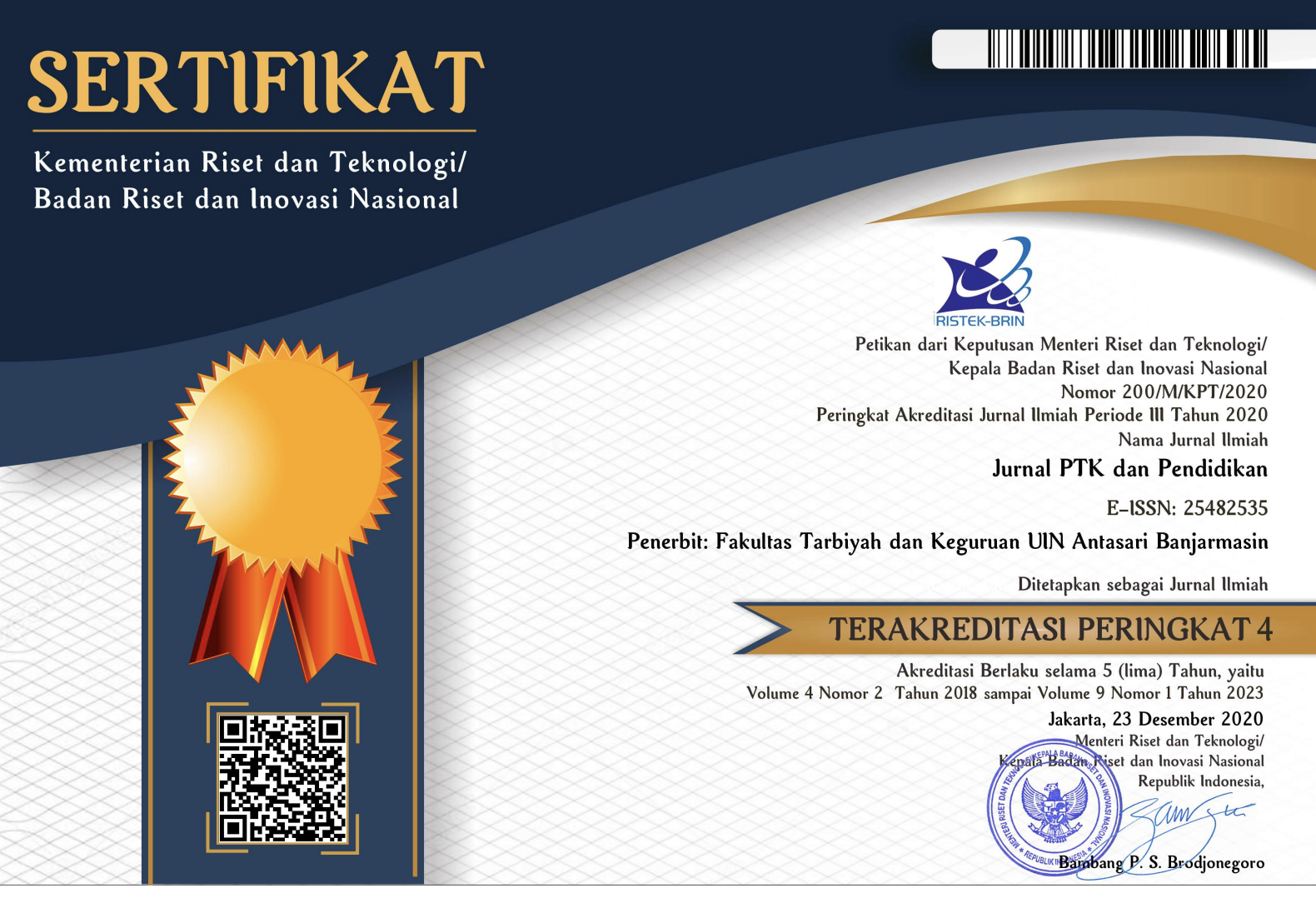ENHANCING STUDENT LEARNING ENGAGEMENT THROUGH BLENDED LEARNING WITH LECTURES AND MIND MAP MEDIA
DOI:
https://doi.org/10.18592/ptk.v11i1.17528Keywords:
Blended Learning, Akidah Akhlak, Manners of Friendship, Mind MapAbstract
The problem of low student learning engagement in the subject of Akidah Akhlak, especially in the material of Adab Berteman, is the main focus of this study. The results of initial observations in class IV Al Qudus MIN 4 Jombang showed that most students tended to be passive, did not understand the values of adab, and had not shown active participation in learning. This study aims to increase student learning engagement through the application of the Blended Learning method which combines a lecture approach with the use of mind map media as a visual aid. This study uses a qualitative approach with the type of Classroom Action Research (CAR) model Kemmis and McTaggart which is carried out in two cycles. Each cycle includes the stages of planning, implementation, observation, and reflection. The subjects of the study consisted of 36 students of class IV Al Qudus. Data collection techniques were carried out through observation, interviews, and documentation. The results of the study showed a significant increase in student learning engagement, the ability to understand the contents of the material, and active participation in discussions and making mind maps. In cycle I, student involvement was still limited, but in cycle II more than 85% of students showed increased participation and were able to compile and explain mind maps with the theme of Adab Berteman independently or in groups. The conclusion of this study is that the Blended Learning method is effective in increasing student learning engagement and helping internalize the values of manners in learning Akidah Akhlak.References
Anggraena, Y., Felicia, N., Ginanto, D. E., Pratiwi, I., Utama, B., Alhapip, L., & Widiaswati, D. (2021). Kajian akademik kurikulum untuk pemulihan pembelajaran (1st ed.). Pusat Kurikulum dan Pembelajaran Badan Standar, Kurikulum, dan Asesmen Pendidikan Kementerian Pendidikan, Kebudayaan, Riset, dan Teknologi. https://repositori.kemdikbud.go.id/24972/
Ardanari, M. S., Wantoro, J., Riyanti, R. F., Siswanto, H., & Lazwardi, A. (2024). Model Problem Based Learning (PBL) untuk Meningkatkan Kompetensi Materi Pengurangan Mata Pelajaran Matematika bagi Siswa Sekolah Dasar Kelas Rendah. Jurnal Ilmiah Kampus Mengajar, 4, 1–13. https://doi.org/10.56972/jikm.v4i1.168
de Vries, D., Slavin, R. E., & Edwards, K. (1978). Teams-Games-Tournaments (TGT): Review of Ten Classroom Experiments. Journal of Research and Development in Education, 12(1), 28–38.
Duma, S. Y., Modjo, A. S., & Walid, A. (2024). The role of Mathematics Education in Developing Critical Thingking Skill in the Industrial Era 5 . 0. 1(December), 1–11. https://doi.org/10.62872/d83tws09
Iswandhary, P. E. (2021). Using Movement Activities in Engaging Young Learners. Indonesian Journal Of Educational Research and Review, 4(3), 543. https://doi.org/10.23887/ijerr.v4i3.42271
Putri, S., Nandayani, K., Nyoman, N., Widiyanti, S., & Hermawan, J. S. (2024). Penggunaan Media Pembelajaran Wordwall dalam Meningkatkan Keaktifan Belajar Peserta Didik Pada Mata Pelajaran IPAS di Sekolah Dasar. INNOVATIVE: Journal Of Social Science Research, 4, 6611–6619. https://doi.org/10.31004/innovative.v4i6.15930
Rahma, N. A., Aunilla, S. A., & Kowiyah. (2024). Analisis Kesulitan Siswa Kelas 4 dalam Memahami Konsep Pecahan dan Implikasinya terhadap Pembelajaran Matematika. Jurnal Arjuna: Publikasi Ilmu Pendidikan, Bahasa Dan Matematika, 2(6). https://doi.org/10.61132/arjuna.v2i6.1356
Raihan, P. A., Aski, N., Guru, P. P., & Kuala, U. S. (2025). Enhancing Students’ Learning Outcomes through the Implementation of the Team Games Tournament Model at SD Negeri 4 Banda Aceh. DIDAKTIKA: Jurnal Penelitian Tindakan Kelas, 3(1), 36–41. https://doi.org/10.63757/jptk.v3i1.107
Rezeki, W. S., Kurniawati, R. P., & Komaladewi, R. (2024). Penerapan Model Pembelajaran Teams Games Tournament (TGT) untuk Meningkatkan Hasil Belajar Bahasa Indonesia Siswa Kelas 5 di Sekolah Dasar Wulan. Jurnal Basicedu, 8, 4637–4644. https://doi.org/10.31004/basicedu.v8i6.8761
Safira, S., & Muthi, I. (2024). Faktor yang Memengaruhi Minat dan Kesulitan Belajar Matematika Siswa Tingkat Sekolah Dasar. Jurnal Pendidikan, Bahasa Dan Budaya, 3(01), 41–49. https://doi.org/10.55606/jpbb.v3i3.3994
Savira, A., & Gunawan, R. (2022). Pengaruh Media Aplikasi Wordwall dalam Meningkatkan Hasil Belajar Mata Pelajaran IPA di Sekolah Dasar. Edukatif : Jurnal Ilmu Pendidikan, 4(4), 5453–5460. https://doi.org/10.31004/edukatif.v4i4.3332
Slavin, R. E. (2020). Cooperative Learning, Teori Riset dan Praktik. Nusamedia.
Sulaimon, J. T. (2025). THE EFFECT OF WORDWALL MEDIA ON PUPILS ACHIEVEMENT IN MATHEMATICS AMONG BASIC. Lentera Sriwijaya: Jurnal Ilmiah Pendidikan Matematika, 07(1), 30–42. https://doi.org/10.36706/jls.v7i1.112
Widyasari, R., Afifah, S. R., Atmojo, I. R. W., & Islami, N. A. (2024). Peningkatan Hasil Belajar Matematika Dengan Model Team Game Tournament (TGT) Menggunakan Aplikasi Wordwall Pada Peserta Didik Kelas VI SD Negeri Banyuagung 3. Social, Humanities, and Educational Studies, 7(4), 632–639. https://doi.org/10.20961/shes.v7i4.97068
Yuliarsih, T., Santosa, S., & Mutiansi, D. (2024). KARAKTERISTIK PERKEMBANGAN ANAK USIA SEKOLAH DASAR, PADA FISIK-MOTORIK, KOGNITIF, BAHASA, DAN IMPLIKASINYA DALAM PEMBELAJARAN. Pendas: Jurnal Ilmiah Pendidikan Dasar, 09 (2), 328–346. https://doi.org/10.23969/jp.v9i2.15770
Downloads
Published
How to Cite
Issue
Section
License
Copyright (c) 2025 Almas Wilda Pradnya Megananda

This work is licensed under a Creative Commons Attribution 4.0 International License.
- The right to publication of all journal material published on the Jurnal PTK dan Pendidikan website is held by the editorial board with the author's knowledge (moral rights remain the property of the author).
- The formal legal provisions for access to digital articles of this electronic journal are subject to the terms of the Creative Commons CC BY 4.0 DEED Attribution International (CC BY) license. This license enables reusers to distribute, remix, adapt, and build upon the material in any medium or format, so long as attribution is given to the creator. The license allows for commercial use.
- Printed and electronic published manuscripts are open access for educational, research and library purposes. In addition to these objectives, the editorial board shall not be liable for violations of copyright law.






